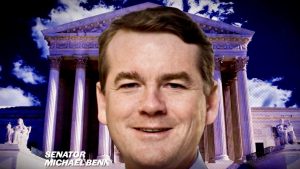It’s not unexpected the New York Times would profile all Democratic candidates running for president.
What’s unusual is the paper refused to disclose its significant conflict of interest in this interview* with Colorado U.S. Sen. Michael Bennet.
A proper disclosure would sound way more snooty like the Times itself, but here’s our version of what should have been noted on the page:
James Bennet, the Times editorial page editor and brother of Michael Bennet profiled on this page, had absolutely no influence whatsoever on this glowing article.
We are aware James Bennet is slated to become the next executive editor of the Times, and our new boss, and we look forward to his benevolent reign.
If Michael Bennet were to become president just as his brother takes the helm of the New York Times, we would consider that a complete fluke and not expect any special favors, or get our front row seat back in the White House press room.
—The Editors (expect for Bennet, of course)
Bennet has recused himself from all opinion coverage of his brother for as long as he’s in the race, the Times fawned in its coverage of itself last month.
Instead, Bennet’s minion will handle coverage of his brother — wink, wink.
This is a glaring example of why the public no longer trusts the media, and not just because this profile is so weak.
Like this question: “Does anyone deserve to have a billion dollars?”
Bennet’s answer: “A democracy cannot survive this lack of economic mobility, and that’s what the next president has to address.”
Not so much deep reporting, as the classic dog whistle liberals always accuse Republicans of sounding.
In this case, the NYT is asking if Bennet favors a redistribution of private wealth, and Bennet has answered in the affirmative, going a step further and declaring it’s the president’s job to do something about it.
* Associated Press reporter Nick Riccardi took issue with our use of the word “profile” to describe the NYT article, which is really mostly heavily edited video with outtakes. We have since replaced the offending word with “interview,” the same word the NYT used to describe its series of videos of candidates answering questions about their family and views.
Riccardi did not comment on whether a disclosure on this special series of interviews that aren’t profiles would be warranted on Bennet’s page.

